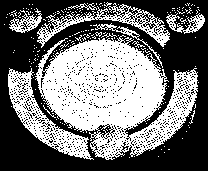
Posted with permission of the American Academy of Optometry:
A. Lit
"Depth-Discrimination Thresholds for Targets with Equal Retinal
Illuminance Oscillating in a Frontal Plane",
American Journal of Optometry and Archives of the American
Academy of Optometry,
vol. 43, issue 5 of May 1966, pages 283 - 298.
Copyright (c) The American Academy of Optometry
1966.
by John Michael Williams, 2000. Placed in public domain.
Stereoscopic acuity was studied in the Pulfrich apparatus without the
different illumination of the two eyes which causes the Pulfrich illusion.
Thus, the observer reported back-and-forth motion, with no apparent
ellipse--no near limb for target motion one way, nor a far limb
for target motion the other way.
Data for equidistance settings at several target speeds and levels of
illumination are reviewed. The localization error (constant error
or observer bias) is reported here, as is the stereoacuity (variable
error) in the settings. The stimulus conditions and results were
the same as reported in Lit (1964).
The discussion here emphasizes that the observer-specific ("personal
equation") localization error probably always should be estimated and
reported when studying the Pulfrich illusion at low illumination or
high target speed.
The geometrical estimation of visual latency by the Pulfrich Effect
always, if possible, should be based both on the apparent near and far
limbs of the Pulfrich ellipse, and should be corrected for personal
equation. However, in the data available at the time of this report,
a small residual difference was found in the near-estimated latency
versus the far-estimated latency, even after all known corrections
had been applied.
Back to Pulfrich Effect Home. University Privacy Policy
The Pulfrich Effect, SIU-C. Last updated 2000-07-23